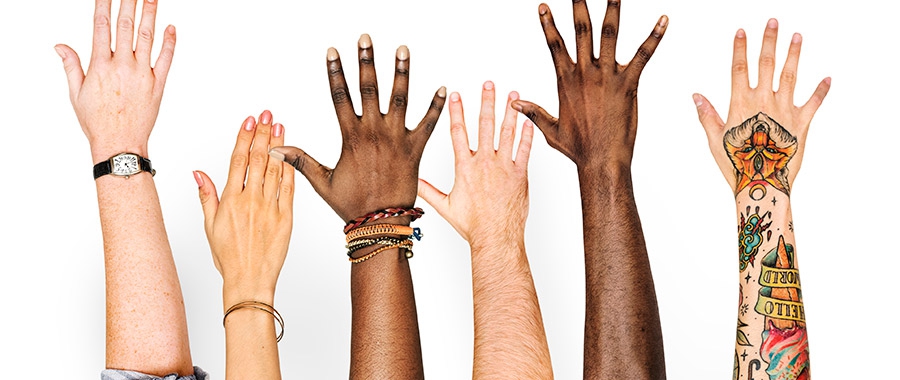The views expressed in our content reflect individual perspectives and do not represent the authoritative views of the Baha'i Faith.
All religions teach that each of us has our own row to hoe and furrow to plow.
Those rows and furrows invariably become crooked when we take our eyes off what we’re doing and spend too much time checking the straightness of other people’s rows.
The Baha’i teachings say that each of us has the responsibility for our own spiritual development—and no responsibility to judge the progress of others:
When divers shades of thought, temperament and character, are brought together under the power and influence of one central agency, the beauty and glory of human perfection will be revealed and made manifest. Naught but the celestial potency of the Word of God, which ruleth and transcendeth the realities of all things, is capable of harmonizing the divergent thoughts, sentiments, ideas, and convictions of the children of men. Verily, it is the penetrating power in all things, the mover of souls and the binder and regulator in the world of humanity. – Abdu’l-Baha, Selections from the Writings of Abdu’l-Baha, p. 292.
Part of the joy inherent in the celebration of diversity is not simply tolerating differences that may or may not be beneficial to us, but appreciating those differences that make us stronger as a group:
Man should know his own self and recognize that which leadeth unto loftiness or lowliness, glory or abasement, wealth or poverty. – Baha’u’llah, Tablets of Baha’u’llah, p. 35.
But to determine what is beneficial—what leads to loftiness and what leads to lowliness—we need to be able to compare our behavior with a standard not of our own making.
If we’ve each adopted a code of conduct for ourselves that merely seems convenient and self-reassuring, there is no way to test it to see if it conduces to our spiritual growth, because we cannot weigh a merely personal standard against itself. Religion has traditionally set the standards for ethical and moral behavior, but if we are not religiously oriented, then we are apt to compare what we believe is right and proper with what a religion says on the subject.
However, we can’t weigh God’s standards against our own. By definition, God’s understanding of what benefits us is far greater than our own. This is why God gives humanity commandments, laws, and ordinances. The Baha’i teachings say:
These are the ordinances of God that have been set down in the Books and Tablets by His Most Exalted Pen. Hold ye fast unto His statutes and commandments, and be not of those who, following their idle fancies and vain imaginings, have clung to the standards fixed by their own selves, and cast behind their backs the standards laid down by God. – Baha’u’llah, The Most Holy Book, p. 25.
When we come across elements of diversity that do not seem to fit with our own sense of propriety, we must not lose sight of what God has envisioned for us. Not all things are good relative to cultural context or locale, and not all things are acceptable just because a lot of other people do them.
In our encounter with the vast range of human diversity, we are bound to encounter some practices that are not beneficial to spiritual growth—but this is not a reason to hate or avoid the people who engage in them. We need to be able to separate the people from their practices and remember that the grace of God rains down on everyone:
God is one, the effulgence of God is one, and humanity constitutes the servants of that one God. God is kind to all. He creates and provides for all, and all are under His care and protection. The Sun of Truth, the Word of God, shines upon all mankind; the divine cloud pours down its precious rain; the gentle zephyrs of His mercy blow, and all humanity is submerged in the ocean of His eternal justice and loving-kindness. God has created mankind from the same progeny in order that they may associate in good fellowship, exercise love toward each other and live together in unity and brotherhood. – Abdu’l-Baha, The Promulgation of Universal Peace, p. 403.
In like manner we should love and associate with each other, not hate and avoid each other. We are each progressing at our own rate and will, in the course of time, discover for ourselves what we need to do to grow spiritually. Self-destructive practices are to be avoided, not the people who practice them, because people always have the ability to change what they do.
If we seek ways to celebrate each other and who we are, prayer provides an invaluable tool for that search. Not only does it give us a means by which to ask for God’s aid and assistance as we work to move beyond merely tolerating differences to celebrating diversity, it also gives us a means to appreciate that part of us which is completely unique to each individual: our spiritual nature. Our souls, like our bodies, are extremely varied, unique, and precious. Just as there is rich diversity in the physical appearances of human beings, there is also rich diversity in the way they connect with God in supplication and prayer. Even so, every connection is precious, every connection is effective:
O Thou kind Lord! O Thou Who art generous and merciful! We are the servants of Thy threshold and are gathered beneath the sheltering shadow of Thy divine unity. The sun of Thy mercy is shining upon all, and the clouds of Thy bounty shower upon all. Thy gifts encompass all, Thy loving providence sustains all, Thy protection overshadows all, and the glances of Thy favor are cast upon all. O Lord! Grant Thine infinite bestowals, and let the light of Thy guidance shine. Illumine the eyes, gladden the hearts with abiding joy. Confer a new spirit upon all people and bestow upon them eternal life. Unlock the gates of true understanding and let the light of faith shine resplendent. Gather all people beneath the shadow of Thy bounty and cause them to unite in harmony, so that they may become as rays of one sun, as the waves of one ocean, and as the fruit of one tree. May they drink from the same fountain. May they be refreshed by the same breeze. May they receive illumination from the same source of light. Thou art the Giver, the Merciful, the Omnipotent. – Baha’u’llah, Baha’i Prayers, pp. 100-101.
















Comments
Sign in or create an account
Continue with Googleor